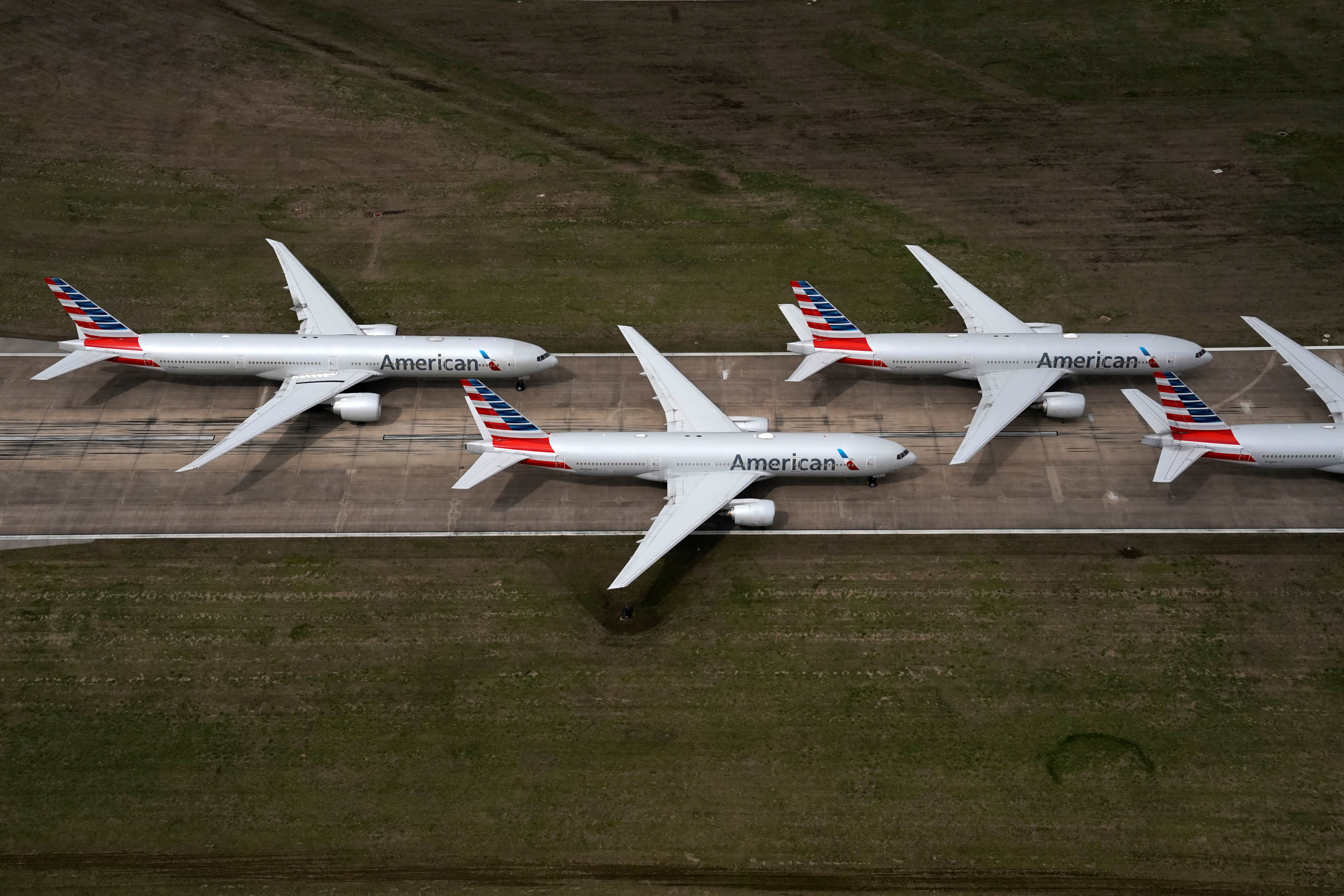American Airlines passenger planes crowd a runway where they are parked due to flight reductions to slow the spread of coronavirus disease (COVID-19), at Tulsa International Airport in Tulsa, Oklahoma, U.S. March 23, 2020.
Nick Oxford | REUTERS
Leading congressional Democrats on Sunday urged Treasury Secretary Steven Mnuchin to quickly reach agreements and not place onerous conditions on $25 billion in payroll grants for airlines reeling from the coronavirus pandemic.
Mnuchin last month said taxpayers must be “compensated” for aid given to airlines. Treasury guidelines state the department said it may demand warrants, options, preferred stock or other securities in exchange for the grants. But industry members, unions and others have argued that if the Treasury Department is too aggressive in its demands, such as by insisting on large equity stakes, it could deter airlines from taking the grants altogether.
In addition to payroll grants, Congress also approved $29 billion in loans to passenger and cargo airlines as part of the historic $2 trillion coronavirus aid package last month.
“The intent of this program was very clear: keep America’s hardworking aviation professionals in their jobs through direct payroll payments from the Treasury Department,” wrote House Speaker Nancy Pelosi, Senate Minority Leader Charles Schumer and other top Democrats.
“We are concerned the Treasury Department’s recent guidance on the ‘Airline Industry Payroll Support’ Program does not fully reflect the intent of Congress,” they wrote.
The Treasury Department had advised airlines requesting payroll grants to submit their proposals by this past Friday. Airlines, including Delta, JetBlue, American, United and Spirit, have said they applied for portions of the aid. They did not disclose the amounts they requested, nor the structure they proposed.
Airlines and the Treasury will now begin negotiations, during which the lawmakers said Treasury must be judicious in its requests.
“Assistance must not come with unreasonable conditions that would force an employer to choose bankruptcy instead of providing payroll grants to its workers,” wrote Pelosi, Schumer, as well as Rep. Peter DeFazio, D-Ore, chairman of the House Committee on Transportation and Infrastructure and Sen. Sherrod Brown, D-Ohio, ranking member of the Senate Committee on Banking, Housing and Urban Affairs.
“While we appreciate the Department’s desire to seek ‘warrants’ in exchange for payroll assistance, we do not support any effort that would undermine the ability of any aviation worker to receive direct payroll assistance,” the lawmakers added.
The letter comes after Sen. Schumer and other top Democrats similarly called on Mnuchin to protect the oversight function of the $500 billion bailout fund established as part of the $2 trillion deal. Mnuchin was a key figure during those negotiations, and he will help run the $500 billion fund. Democrats have said they will closely watch all money dispensed from the bailout fund, including airline aid.
The Treasury Department did not immediately return a request for comment.
Airlines’ grim forecast
Even with grants that could keep their roughly 750,000 workers retained and paid through Sept. 30, airlines are digging in for a prolonged slump in travel demand because of the virus. The virus, which has infected more than 300,000 in the U.S., and harsh measures to avoid it from spreading further are likely to keep a lid on demand in the coming months, executives have said.
Delta CEO Ed Bastian on Friday said the airline applied for its share of the worker grants, but warned more funds are needed.
“But those funds alone are not nearly enough,” Bastian wrote to employees, adding that the carrier expects second-quarter revenue to fall 90% on the year. “Without the self-help actions we are taking to save costs and raise new financing, that money would be gone by June.”
Those actions that Delta and its competitors are taking include shrinking their networks, parking hundreds of jets and asking thousands of employees to take unpaid or partially paid leave.
President Donald Trump last week signaled his administration is considering restricting domestic flights from coronavirus hot spots, but his administration hasn’t made such an order and airlines are making significant cuts of their own.
United Airlines said Saturday that it is slashing service at its Newark hub from 139 daily flights to just 15, and from New York’s LaGuardia Airport from 18 to two daily flights for the next three weeks.
“While New York and New Jersey are the primary COVID-19 hotspots today, we will also watch the situation on the ground in stations all across our network and evaluate additional mitigation measures we can take in those locations as well,” Greg Hart, United’s chief operations officer, wrote to employees on Saturday. United’s local employees will continue to be paid with benefits despite the reduction, Hart said.
JetBlue’s CEO told employees on Friday that the company is burning through $10 million a day as the carrier spends more than it is making. The airline said its April capacity will be down 70% from a year ago, with deep cuts in New York, where it’s based, and the surrounding area.
United, Delta and JetBlue have offered medical volunteers free flights.
